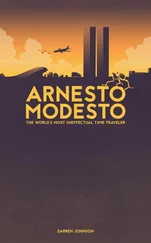James Gleick - Time Travel
Здесь есть возможность читать онлайн «James Gleick - Time Travel» — ознакомительный отрывок электронной книги совершенно бесплатно, а после прочтения отрывка купить полную версию. В некоторых случаях можно слушать аудио, скачать через торрент в формате fb2 и присутствует краткое содержание. Год выпуска: 2016, Издательство: Knopf Doubleday Publishing Group, Жанр: Старинная литература, на английском языке. Описание произведения, (предисловие) а так же отзывы посетителей доступны на портале библиотеки ЛибКат.
- Название:Time Travel
- Автор:
- Издательство:Knopf Doubleday Publishing Group
- Жанр:
- Год:2016
- ISBN:нет данных
- Рейтинг книги:5 / 5. Голосов: 1
-
Избранное:Добавить в избранное
- Отзывы:
-
Ваша оценка:
- 100
- 1
- 2
- 3
- 4
- 5
Time Travel: краткое содержание, описание и аннотация
Предлагаем к чтению аннотацию, описание, краткое содержание или предисловие (зависит от того, что написал сам автор книги «Time Travel»). Если вы не нашли необходимую информацию о книге — напишите в комментариях, мы постараемся отыскать её.
Time Travel — читать онлайн ознакомительный отрывок
Ниже представлен текст книги, разбитый по страницам. Система сохранения места последней прочитанной страницы, позволяет с удобством читать онлайн бесплатно книгу «Time Travel», без необходимости каждый раз заново искать на чём Вы остановились. Поставьте закладку, и сможете в любой момент перейти на страницу, на которой закончили чтение.
Интервал:
Закладка:
“Well, didn’t you?” he calmly retorts. “You were there.”
Young Bob still doesn’t like it. “You would have me believe that causation can be completely circular.” And Old Bob, despite all his hard-won knowledge, never stops working to fulfill his destiny. He does not wait for his earlier selves to play their roles; he manipulates them urgently. The narrator says: “Everyone makes plans to provide for their future. He was about to provide for his past.” Taken all in all, this story is a snake pushing its own tail while musing about whether the effort is necessary.
The author, churning out stories on his manual typewriter to pay the bills in Southern California, trying to make his plots plausible and his characters convincing, has his own problem with free will. He makes his people into puppets, the strings flickering in and out of our sight. Their own view is foreshortened. Only the omniscient author, with his penciled diagrams, sees everything at once. We readers are caught up in the story, remembering the past, anticipating the future; we are mortals, for whom now means now.
It’s not easy to get past that, in reading stories or in living our lives. As Heinlein puts it, we must make “a strong and subtle intellectual effort to think other than in durational terms, to take an eternal viewpoint.” Free will cannot be easily dismissed, because we experience it directly. We make choices. No philosopher has yet sat down in a restaurant and told the waiter, “Just bring me whatever the universe has preordained.” Then again, Einstein said that he could “will” himself to light his pipe without feeling particularly free. He liked to quote Schopenhauer: Der Mensch kann wohl tun, was er will; aber er kann nicht wollen, was er will. Man can do what he will, but he cannot will what he wills.
The free will problem was a sleeping giant and, without particularly meaning to, Einstein and Minkowski had prodded it awake. How literally were their followers to take the space-time continuum—the “block universe,” fixed for eternity, with our blinkered three-dimensional consciousnesses moving through it? “Is the future all settled beforehand, and only waiting to be ‘pushed through’ into our three-dimensional ken?” asked Oliver Lodge, the British physicist and radio pioneer in 1920. “Is there no element of contingency? No free will?” He begged for a sort of modesty. “I am talking geometry, not theology, and it would be a stupid mistake to pretend to decide questions of high reality by aid of mere groping analogies and mathematical analysis….The human race has not been in existence very long; it began its scientific studies very recently; it is still scraping on the surface of things, the three-dimensional surface of things.” We may say the same, a century later.
—
PHILOSOPHERS DID NOT NEED the space-time continuum to tell them that there were problems about free will. As soon as the rules of logic were added to the human tool kit, the ancients found themselves capable of constructing the most amusing puzzles. Human language switches between past and future with a simple change of tense, and this can trap the unwary.
“For what is and what has come about, then, it is necessary that affirmation, or negation, should be true or false,” Aristotle said. In other words, statements about the present and statements about the past are either true or false. Consider the proposition There was a sea battle yesterday. True or false. There is nothing in between. So it is natural to consider whether this applies to statements about the future. There will be a sea battle tomorrow. By Saturday this will be true or false, but must it be either true or false now ? Put in terms of language and logic, these propositions look identical, so the same rules should apply. There will be a sea battle tomorrow. If it’s not true or false, what else is there?
Aristotle remained unconvinced. He carved out an exception for propositions about the future. Where the future is concerned, he felt logic needed room for another state of things: call it indeterminate, contingent, unfixed, unknown, up for grabs…The modern philosopher finds this clumsy.
By the weekend, there will have been a sea battle. Not every language has a future perfect progressive tense built in; when your language does, it tends to feel natural. Either there will have been a sea battle or there won’t. When the time comes, we’ll know which. It will seem to have been inevitable. In this way, language and logic tend to suggest an eternalist view, the Universe Rigid, the view that gained solidity with the arrival of clockwork physical laws as revealed by Newton and Laplace. The block-universe package was wrapped and sealed, seemingly, in the four-dimensional space-time continuum. The new physics profoundly influenced philosophers, whether they acknowledged it or not. It freed them from the common intuitive sensation that past and future are quite different. It freed philosophers, that is, while imprisoning the rest of us. “Past and future must be acknowledged to be as real as the present,” wrote Bertrand Russell in 1926, “and a certain emancipation from slavery to time is essential to philosophic thought.” *2A fatalist says: Everything that happens had to happen. Q.E.D.
Donald C. Williams, a realist from California, picked up that thread at midcentury with a paper on “The Sea Fight Tomorrow.” His brand of realism was four-dimensional—fully modern, in other words. He asserted “the view of the world, or the manner of speaking about it” (a nice distinction, so easily forgotten),
which treats the totality of being, of facts, or of events as spread out eternally in the dimension of time as well as the dimension of space. Future events and past events are by no means present events, but in a clear and important sense they do exist, now and forever, as rounded and definite articles of the world’s furniture.
In the 1960s, the sea battle of tomorrow got a new life in the journals of philosophy. An argument raged over the logic of fatalism, and a milestone in the debate was the essay “Fatalism” by Richard Taylor, a metaphysician and beekeeper at Brown University. “A fatalist,” he wrote, “thinks of the future in the manner in which we all think of the past.” Fatalists take both past and future as given, and equally so. They may get this view from religion or, lately, from science:
Without bringing God into the picture, one might suppose that everything happens in accordance with invariable laws, that whatever happens in the world at any future time is the only thing that can then happen, given that certain other things were happening just before, and that these, in turn, are the only things that can happen at that time, given the total state of the world just before then, and so on, so that again, there is nothing left for us to do about it.
Taylor proposed to prove fatalism entirely by philosophical reasoning, “without recourse to any theology or physics.” He used symbolic logic, representing the various statements about the sea battle in terms of P and P ′ and Q and Q ′ . All he needed were “certain presuppositions made almost universally in contemporary philosophy.” Something had to give: either fatalism or the rules of logic. A philosophy battle ensued. One of Taylor’s presuppositions was not as evident to everyone else: “that time is not by itself ‘efficacious’; that is, that the mere passage of time does not augment or diminish the capacities of anything.” In other words, time itself is not an agent of change; more of an innocent bystander. Time doesn’t do anything. (“What is a mere passage of time” retorted one of his critics. “Could time possibly pass without something, somewhere, changing—without the tick of a clock, the movement of a planet, the twitch of a muscle, or the sight of a flash?”)
Читать дальшеИнтервал:
Закладка:
Похожие книги на «Time Travel»
Представляем Вашему вниманию похожие книги на «Time Travel» списком для выбора. Мы отобрали схожую по названию и смыслу литературу в надежде предоставить читателям больше вариантов отыскать новые, интересные, ещё непрочитанные произведения.
Обсуждение, отзывы о книге «Time Travel» и просто собственные мнения читателей. Оставьте ваши комментарии, напишите, что Вы думаете о произведении, его смысле или главных героях. Укажите что конкретно понравилось, а что нет, и почему Вы так считаете.












